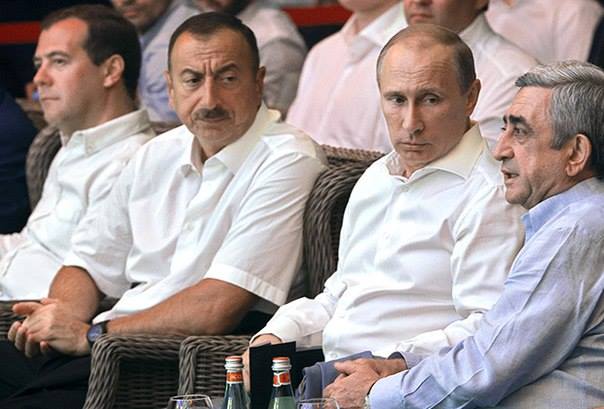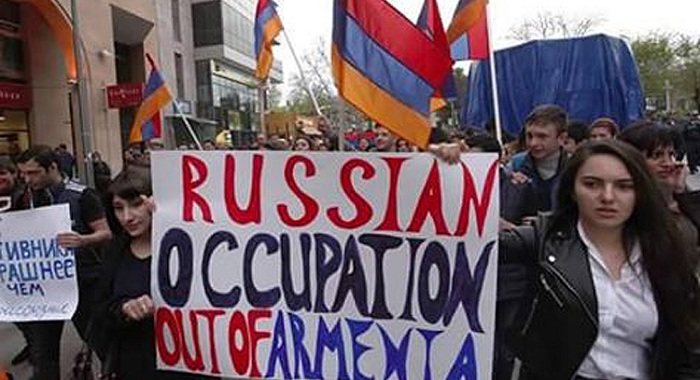Armenian`s anti-Russia demonstrations show that there is a clear-cut agreement between Azerbaijan and Russia on the issue of Nagorno-Karabakh. It can be deemed that Armenia is also informed about the agreement and Yerevan is given time to come to agreement.
Demonstrators` actions, such as throwing eggs to Russian embassy, burning Russian flag and police`s endurance for protesters in such an authoritarian country is an indirect objection of the authority to Kremlin. With this Yerevan intends to show that Russia is losing its confidence in Armenian community.
However, it leaves a question mark over minds - Why? Yet, Russia has not announced anything officially about peace plans. If there is any agreement, only authoritative elites may be informed about this, not the whole public. Even Moscow obliges Yerevan to join this agreement. It means that protests against Russia are organized by the government fictitiously. The reason is too simple, so Yerevan doesn’t have any other option for showing resistance to Moscow.
It can be assumed that the agreement is achieved between Russia and Azerbaijan about returning primarily 5 regions, afterwards part of Kalbajar and Lachin and suspension of Nagorno-Karabakh status for uncertain time. It goes without saying that the agreement is not achieved disinterestedly and in return, Azerbaijan will have to make some steps in favor of Russia in international arena. For example, if Turkey stops supporting Crimea Tatars, Putin`s ‘Crimea’ plan can be saved from the fiasco. Possibly, these rationales are behind president Ilham Aliyev’s meeting with Crimean Tatars’ leader Mustafa Jamilov.
Thus, if Russia agreed with the return of 5 regions and Sargsyan authority expressed their rejection by resisting, there are two presumable scenarios for being played. Beforehand, it is necessary to note that Russia needs to realize this plan in such a way that Russia don`t lose political influence over Armenia.
Taking into account this, Moscow’s attempt to revolution in Yerevan can be assumed as the first scenario. In other words, Sargsyan will be overthrown, when the person, who is willing to realize Moscow’s order comes to the post, relevant agreement will be signed with Azerbaijan.

A number of Armenian media outlets have already spread information on establishing interim government and holding new presidential elections.
The most real candidate of Russia is the former president of Armenia Robert Kocharyan. Organizing an armed attack on house of the former president may have two reasons: either by threatening to alienate him from his ambitions or to create an illusion of pressure on Kocharyan. In both cases, this is the factor that proving Kocharyan is an assertive candidate.
Kocharyan`s readiness to fulfill any order of Russia to regain the throne, as well as the formation of ruling elite of Armenia by Kocharyan, make him irreplaceable candidate for Moscow. It means, after Kocharyan came to power, he will not face with serious resistance of inter-governmental groups.
Sargsyan understands that because of his latest failures on the contact line his political team prepares to refuse of him. Urgent consultations with former president Levon Ter Petrosyan are the signals of uniting with opposition against Kocharyan. In this case, it is quite understandable that why Ter Petrosyan is a president`s advisor. By coaxing Ter Petrosyan, Sargsyan hopes to change public opinion and to prevent coup plan of Russia.
Another scenario can be the change of authority and election of new president. However, it will not satisfy Azerbaijan if it takes a long time to return the lands. It can be hazardous that newly established government will not commit to the deal as expected.
Thus, possibly the second scenario will be further escalation of tension for power in Armenia. According to the scenario, agreeing with Russia, Azerbaijan will liberate its occupied lands by means of military power. After that, new round of talks will begin with newly established team in Armenia on the status of Karabakh.










-1745485667.jpg&h=190&w=280&zc=1&q=100)





































